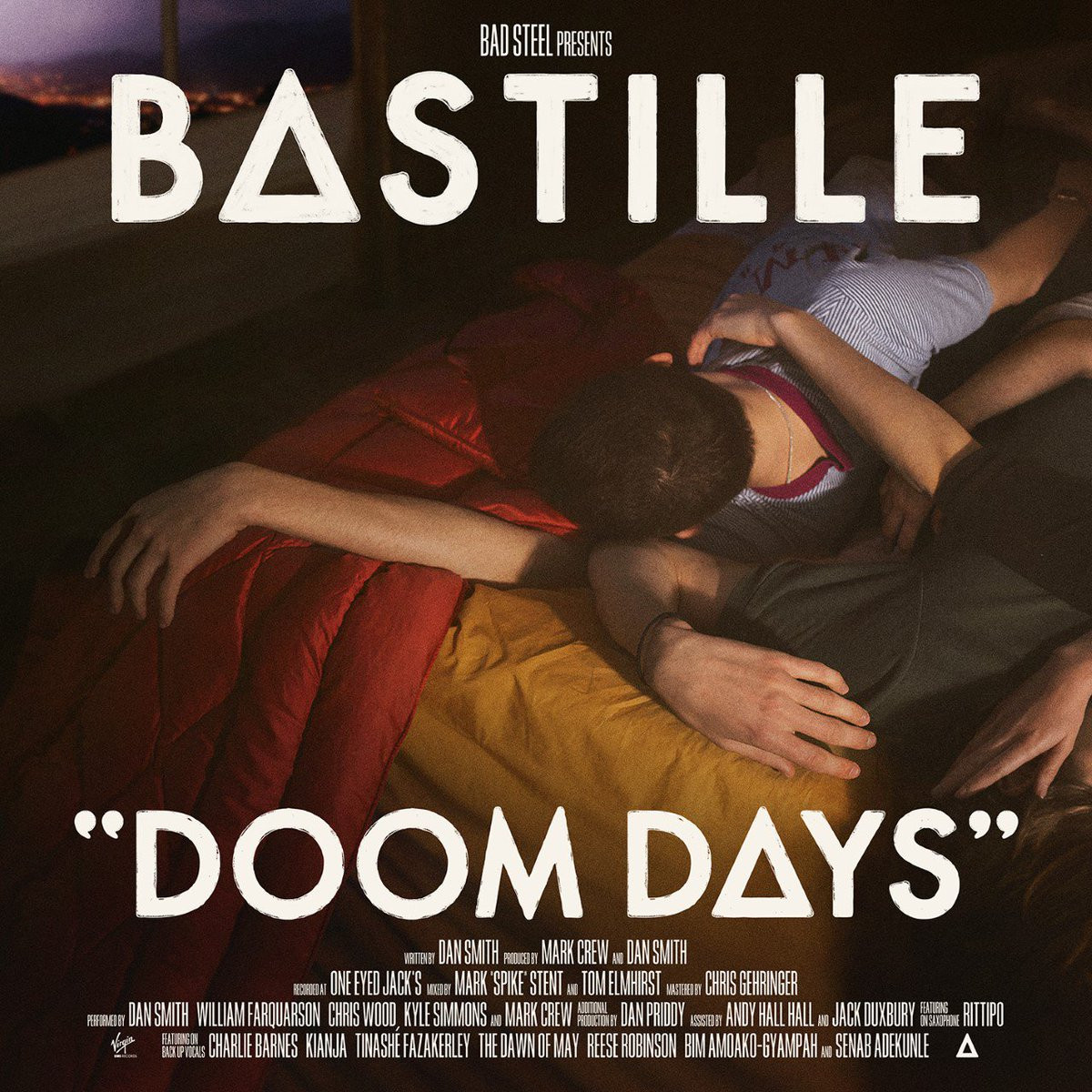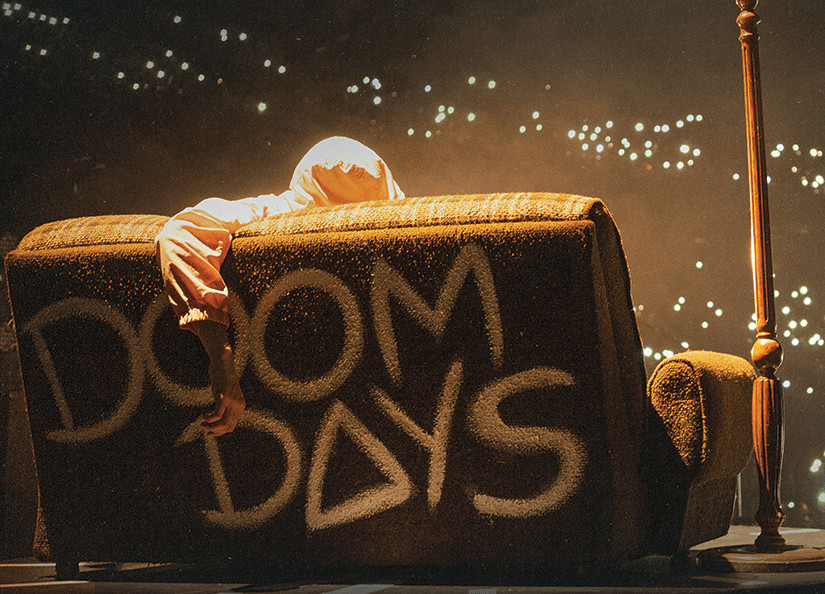Bastille burst onto the music scene in 2013 with “Pompeii,” a track that echoed through mainstream airwaves and heralded their debut album, Bad Blood. This record carved out a niche for the UK band, blending indie pop sensibilities with a hint of alternative edge. Three years later, Wild World arrived, amplifying the distortion, delving into social commentary, and doubling down on their signature indie pop-rock sound. Then came Doom Days in 2019, a concept album pitched as a sonic journey through a raucous party during the apocalypse, a rollercoaster of emotional highs and lows.
For many, including myself initially, Bastille remained somewhat on the periphery. “Pompeii” was undeniably catchy, a radio staple of its time, but Wild World seemed to slip by almost unnoticed. In fact, on my year-end list for 2016, I even dubbed it one of the most overrated albums, dismissing the band as another mainstream “alternative” act chasing pop appeal.
 Bastille Band Image
Bastille Band Image
Looking back, Bad Blood, their debut, felt sonically conflicted – overproduced yet somehow undercooked. The tracks swung between bombastic anthems and uninspired filler, the mixing either too sterile or so stripped back they resembled demos. Fans lauded the lyrics as profound, but to me, they often came across as pretentious and simplistic.
However, it’s important to consider the musical landscape of 2012-2013. Alternative-leaning bands were crossing over into mainstream pop with a raw, authentic style, both instrumentally and lyrically, delivering those stadium-ready anthems. Think of Imagine Dragons with their massive hits like “It’s Time” and “Demons,” Of Monsters and Men’s “Little Talks” and “Mountain Sound,” Fun.’s “Some Nights” and “We Are Young,” The Lumineers’ “Ho Hey,” Passion Pit’s “Take a Walk”—the list goes on. Bad Blood and Imagine Dragons’ Night Visions were almost sonic twins, sharing that folky undertone, larger-than-life choruses, and classic instrumentation sprinkled with electronic touches. Bastille fit neatly into this mold, but the formula felt increasingly stale.
Wild World felt like a step sideways, perhaps even backwards. The inclusion of heavier guitars was a welcome change, lending a grittier edge that suited them. But the production was jarring, riddled with strange background noises, peculiar snare sounds, and distracting backing vocals. Choruses felt underdeveloped, often relying on repetitive lines, and the attempts at sociopolitical commentary were shallow and generic. Worse still, a sense of sonic monotony permeated the album. Distinguishing tracks became a challenge, and the entire listening experience became forgettable after just one play, echoing the fate of Mumford & Sons’ Wilder Mind, another band that attempted a “rock” record only to deliver something bland and easily overlooked. Ironically, the only tracks that resonated were the bonus tracks.
Image: Bastille performing live at the Pinkpop Festival, capturing their energetic stage presence.
To be fair, Bad Blood and Wild World aren’t objectively bad albums. Overrated, perhaps, but not terrible. I simply couldn’t connect with the hype, but musical taste is subjective. So, imagine my surprise when Doom Days first hit my ears. I… actually enjoyed it. Me? A Bastille album? Yes, it’s true. I found myself liking Doom Days. It took a few listens to fully appreciate, but the fondness grew. Perhaps my low expectations played a role, but regardless, I was genuinely impressed. Let’s dive into this latest offering, leaving behind the baggage of their previous albums.
When the lead single, “Quarter Past Midnight,” dropped, heralding a new Bastille era, my initial reaction was lukewarm. It didn’t grab me, and the collaboration with M********o on “Happier” left me equally indifferent. However, upon the official release of Doom Days, curiosity, perhaps mixed with a desire for a good laugh, led me to give it a listen. The first spin left me unconvinced, but with each subsequent play, I found myself increasingly captivated. Initially, the concept album label seemed tenuous, more a collection of recurring themes than a cohesive narrative. Now, I see the vision, and while “concept album” might be a stretch, I understand the band’s perspective.
Should we address the album’s shortcomings first, paving the way for a positive conclusion, mirroring the album’s own journey? While Bastille has toned down the forced depth in their songwriting, moments still arise where they attempt to oversell an idea as profoundly emotional when it doesn’t quite reach those heights. Apocalypse! Relationships! The themes are there, but sometimes lack genuine impact.
Furthermore, the slower tracks on Doom Days often build to grand, sweeping endings. While these crescendos offer breathers before launching back into another massive chorus, the album could benefit from a truly quiet, understated song to provide genuine contrast. “Those Nights,” for example, offers a reflective look at the universal craving for connection in challenging times. The power ballad piano chords are effective, but the song culminates in an unexpected dubstep-esque breakdown that feels somewhat out of place.
Speaking of unexpected turns, “Another Place” and “Million Pieces” lean heavily into EDM influences. Perhaps this was a nod to fans gained from “Happier,” or simply an exploration of new sonic territories. While these tracks are enjoyable and add variety, some production choices are questionable. The repetitive whooping in the “drop” of “Million Pieces,” the overly processed vocals and strange background noises in “Another Place,” and the unnerving squeaky sound that surfaces on the upbeat during the chorus of “Joy,” one of the album’s highlights, are minor distractions. Intriguing guitar riffs occasionally appear but are often buried beneath layers of percussion or soundscapes. While I’m generally wary of alternative bands incorporating heavy synths, Bastille’s foray into dance-influenced electropop feels like a natural progression, given their electronic undercurrents since Bad Blood. However, the album could have benefited from more prominent and engaging bass lines.
 Doom Days Album Art
Doom Days Album Art
Lyrically, some pop culture references feel forced and detract from the moment. The title track, “Doom Days,” opens with “There must be something in the Kool-Aid” and later shoehorns in a cringeworthy Peter Pan reference. Peter Pan resurfaces, less awkwardly, in “The Waves” with the line, “We never, never give up on the lost boy life,” a more generalized and palatable interpretation. Stanley Kubrick gets a mention in “Bad Decisions,” the significance of which remains unclear. The title track also feels overcrowded, cramming societal commentary over an awkward trap beat in its short runtime.
However, these criticisms are minor and don’t overshadow the album’s overall appeal. They are nitpicks that don’t significantly detract from the listening experience, especially considering my admittedly tempered expectations for Bastille.
On the positive side, Doom Days has many redeeming qualities. Dan Smith’s vocal performance is significantly improved, showcasing a wider range and control compared to Bad Blood, particularly evident in tracks like “Joy” and “Bad Decisions.” The album’s concise tracklist, with just 11 standard tracks and two bonus tracks, is a welcome change from the sprawling 19 tracks of Wild World. This brevity minimizes filler and sonic repetition, resulting in a more focused and engaging listen.
The cohesion between tracks is noteworthy, essential for a concept album. Subtle nuances weave the songs together. In “4AM,” the background vocals echo the bridge from the opening track (“I can’t remember…”) and earlier lines from the closing track (“Might be a walking disaster”). “Those Nights” fades out with “From my brain,” seamlessly leading into “Joy,” where the lyrics echo the bridge’s refrain. It’s in these subtle details, like when you hear “it’s a quarter after one,” within “Quarter Past Midnight,” that the album’s narrative of a night unfolding truly takes shape.
The overarching theme of “doom days” permeates the album. Bastille aimed to create a sense of escapism, navigating dark times through revelry and interpersonal connections. The title track touches upon our phone dependency, blurred lines between reality and fiction, and denial of planetary woes. While these weighty themes are packed into the album’s shortest track, potentially hindering their full exploration, the irony isn’t lost. Our tech addiction is subtly highlighted in the closer, “Joy,” where the protagonist finds solace solely in a lover’s phone call. This juxtaposition tastefully underscores our complex relationship with technology.
 Dan Smith of Bastille
Dan Smith of Bastille
The fervent “Million Pieces” expresses global heartbreak, lamenting “The king’s a clown,” “we’re too far gone,” and “no one is loving.” The second verse reiterates the escapist theme: “Just drink, f**k, dance right through disaster,” a fitting tagline for Doom Days. While lyrically somewhat vague, “Million Pieces” effectively conveys the despair of our current social climate, wrapped in a danceable pop beat.
Instrumentally, Doom Days shines with stellar piano melodies, particularly in “Quarter Past Midnight,” “Divide,” and “Nocturnal Creatures.” String sections are also tastefully sprinkled throughout. This blend of organic and electronic instrumentation creates a modern and original sound, a significant improvement over its predecessor.
Gospel choir chorales are expertly integrated, culminating in the finale of “Joy.” Bastille has always utilized vocal harmonies, but on Doom Days, the gospel influence is amplified, especially on “Joy,” where the choral refrains lend a holy, uplifting, and joyous quality. The choir feels integral to the song’s impact. “The Waves” also benefits from choral voices, adding grandeur and enthusiasm.
Ultimately, my appreciation for Doom Days is subjective. Art is inherently subjective. I’d describe Doom Days as mediocre indie pop at its finest, and for some reason, I genuinely enjoy it. The compositions are generally well-crafted. It’s an entertaining pop album, easy to listen to. You might find deeper meaning, but Bastille isn’t forcing any profound statements. The sound won’t appeal to everyone, but fans of pop, electropop, indie pop, or lighter alternative music might find it to their taste. It fits into the “millennial pop” category with its lyrical themes and musical style, and it embraces that identity. Sometimes, less is more, and Doom Days, with its tighter tracklist, production, and relatable lyrics, proves that point.
Overall, Doom Days is Bastille’s strongest album to date. While still flawed and occasionally uninspired, it’s a solid effort. I’m giving it a 7.5/10… for now. That rating might evolve, but for the moment, I’ll happily dance through these doom days.
Let me know your thoughts on Doom Days in the comments below!
 Bastille Live Performance
Bastille Live Performance
